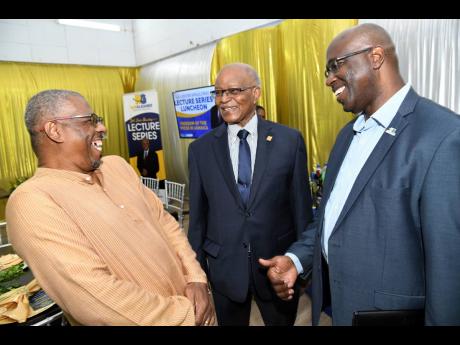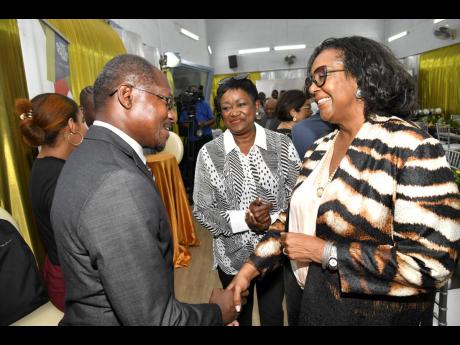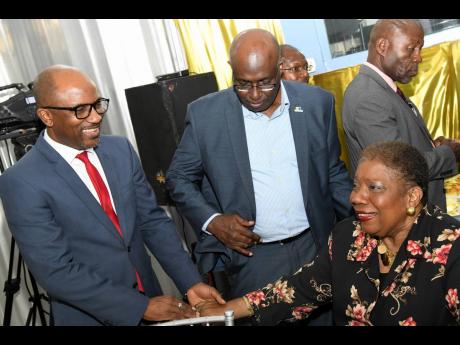Patrick Prendergast | Speaking truth, defending credibility, advancing democracy – Pt I
The following is the first part of excerpts from the presentation made by Patrick Prendergast, campus director, The University of the West Indies – Western Jamaica campus, during the RJRGLEANER Communications Group’s Inaugural J.A. Lester Spaulding Lecture, held on World Press Freedom Day, May 3, at Studio One, Broadcasting House in St Andrew.
In an article I wrote on grass-roots communication that was published about a decade ago, I said:
“Media and communication as techniques and technologies, having both cultural and accounting functions and as central tools of the modernity project - due to their potent capacity for information dissemination and technological adaptability - are also themselves significant indicators of development.
Thus… the higher the incidence of modern media or the greater the access to modern information and communication technologies – computer, cell phones, Internet – the more developed (a) society (is) considered (to be).”
As Arturo Escobar argues, media and communication technologies provide both direction and significance to modernist ideals.
“Since media and communication have been significant to the construction of false notions of development, they must also play a critical role in both the deconstruction as well as the re-socialisation of society….”
We must always look beyond the obvious distinctions between print, broadcast and film to other distinctions, such as between media as business and media for development, in seeking to better understand and appreciate not only the role of media and communication in the democratic evolution of our society, but also their function as simultaneously giving voice and being a catalyst for social action” (Prendergast in Caribbean Quarterly Vol 58, No.2/3, June – September 2012).
The second point has to do with the notions of freedom and independence. These words are not to be used interchangeable, nor are they to be considered as having the same meaning for operationalisation. I know I can get into a little bit of a trouble here…but I will always seek to encourage conversations about freedom of the press and independence of media as symbiotic processes and outcomes, as performance and product, as instruction and accountant in the development of Jamaica and the Jamaican society.
There may be freedom of the press – and I will never seek to challenge the accuracy of the press freedom index, which up to its last declaration ranked Jamaica as high among those countries that are safe place for the press – better than many who we continue to ‘pedestalize’ as examples to model – but when it comes to an independent media, while we do come out in a favourable position on the press freedom index because of that, there may be issues of independence that students at our universities may want to explore.
Media independence is not just about freedom from political interference, but also as freedom from financial interference. I believe that to be a critical element of Lester Spaulding’s legacy – understanding and appreciating the link between independent media and media freedom from a financing perspective.
So, even as we discuss the legacy of Lester Spaulding the activist advocate, the remarkable visionary, the astute collaborator, the people-centred manager, it is my hope that – even if we do not bring any new information to the table – we will have reignited something in all of us here to take a step back and reflect on:
The significant growth and impact of Jamaican media since independence in 1962;
The critical role of media in keeping the Jamaican public knowledgeable and aware – especially about government actions;
Globalisation and how the removal of barriers assist increased awareness of global news, politics, and culture, and its influence on the life and destiny of our country and people; and
How independent media are in the current polarised environment, and what do we do to improve on our high ranking on the press freedom index.
PRESS FREEDOM AND THE WPF INDEX
For those who have had the lived experienced working through the evolution of Jamaican media – especially over the last 30 years with the mushrooming of particularly broadcast media and the expansion of the newspaper space – there is certainly not much contention about who or what parts of the press are free. Those who consistently listen to the talk shows, the news shows, the news reporters and producers, the opinion leaders and commentators will regularly hear what comes across as genuine statements of fact, that neither the owners nor the managers of these media systems or news rooms interfere with the work or output of our news people and media workers.
Non-interference from owners is a common thread among contemporary media workers; but it had not always been so, especially during the period when there was more state-owned media. Today, there seem to be a high level of confidence in the news reporters, journalists, commentators and editors to abide by the professional standards that define excellence in journalism. Excellence is a direct threat to those who wish to interfere.
The World Bank defines freedom of the press as “the right to circulate opinions in print and other media without censorship by the government”.
The United Nations’ 1948 Universal Declaration of Human Rights states: “Everyone has the right to freedom of opinion and expression; this right includes freedom to hold opinions without interference, and to seek, receive, and impart information and ideas through any media regardless of frontiers.”
I believe press freedom is more than about government censorship or the right to freedom of expression. Though these are major factors in determining press freedom, I maintain that we must consider always, the responsibilities to free press on both the part of those who create policy and establish regulations and those who are in the field being the people’s watchdog.
ASSOCIATED RIGHTS SAFEGUARDED
Freedom of the press, like all other freedoms, comes with rights and responsibilities on all sides; therefore, all who are in media, in government, in the public market place, all who wish to exercise their right to freedom of expression, must at least know what these rights and responsibilities are if we are going to ensure that both freedom and associated rights are safeguarded. We cannot just be ok with picking at something only when we feel aggrieved, injured, or rubbed the wrong way.
According to UNESCO, the WPF index calculate(s) the degree of freedom available to journalists in 180 countries by pooling the responses of experts to a questionnaire devised by Reporters Without Borders (RSF), targeted to media professionals, researchers, academics and human-rights defenders. The qualitative analysis is combined with the quantitative data on abuses and acts of violence against journalists during the period evaluated. The criteria considered in the questionnaire are pluralism, media independence, media environment and self-censorship, legislative framework, transparency, and the quality of the infrastructure that supports the production of news and information.
Jamaica usually scores well on these criteria. Generally, it is in the nuances of these criteria that we find the weak spots, and so media must remain vigilant in keeping these freedoms from quietly eroding or being quietly erased. For example, we ought to be more strident in ensuring that the quality of the supportive infrastructure includes levels of training and education and specific standards for enlisting as a media professional. There ought to be established conditions to be regularly met for remaining a media professional!
As a country, Jamaica consistently ranked in the top 10 for several years – albeit usually in the bottom half of the top 10 – but in the 2022 report dropped into the top 20 – yes, still closer to the top 10 at 12. But even the slightest of movement must give us cause for concern and stimulus to question whatever slight shifts there may be.
This year, 2023, we have dropped 20 places to 32, so we need to take a pause and ask: What is happening here? It is particularly concerning especially when we consider, for example, the humongous drop in the legislative index.
According to Christophe Deloire, secretary general of Reporters Without Borders, the World Press Freedom Index shows enormous volatility in situations, with major rises and falls and unprecedented changes, such as Brazil’s 18-place rise and Senegal’s 31-place fall. This instability is the result of increased aggressiveness on the part of the authorities in many countries and growing animosity towards journalists on social media and in the physical world. The volatility is also the consequence of growth in the fake content industry, which produces and distributes disinformation and provides the tools for manufacturing it.
Jamaica’s ranking needs deeper analysis and cannot be just passed over in a simple statement that “the environment for journalism is ‘bad’ in seven out of 10 countries, and satisfactory in only three out of 10” (RSF 2023).
Dr Patrick Prendergast is campus director of the UWI Mona – Western Jamaica campus in Montego Bay and a senior lecturer in development communication.



